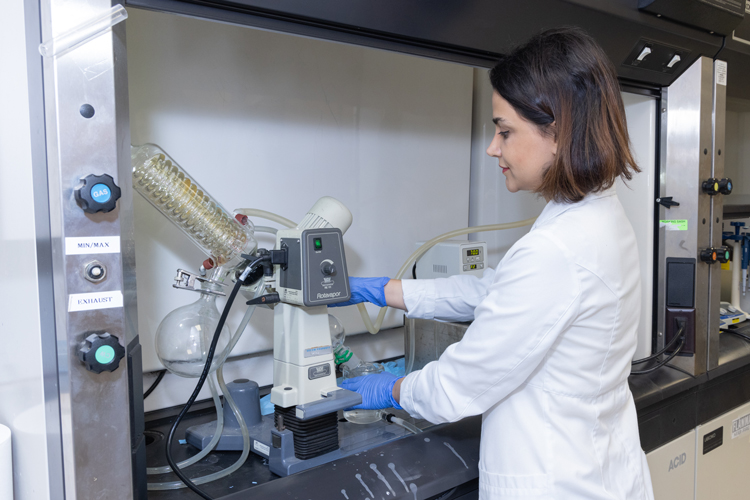Discover how a Master of Science (M.S.) in Pharmaceutical Sciences can improve your leadership skills, open doors to a higher salary, enhance your research skills, and more. At Nova Southeastern University's Barry and Judy Silverman College of Pharmacy, you’ll have the opportunity to improve your career and the lives of your future patients.
This one-year graduate program offers four specialized areas of expertise to choose from:
- Cosmetic Science, focusing on pharmacy-based cosmetic science—from formulation to market.
- Molecular Medicine and Pharmacogenomics, centering on mechanism of action of drugs.
- Pharmaceutics, focusing on drug delivery to the desired target.
- Pharmacoeconomics and Outcomes Research, concerned with evaluating the value and real-world impact of drug therapy.
Upon successful completion of the M.S. in Pharmaceutical Sciences degree, you'll be prepared for positions in academia, or technological or managerial positions in the pharmaceutical industry, healthcare systems, government agencies, and beyond. This program also readies you for further study in a doctoral program.
Quick Facts
Learn More About Master's Programs Admissions
Curriculum
The courses are representative of the overall requirements of the program at the time of publication, and are subject to change. The curriculum is revised, as needed, to meet the demands of the profession. For learning outcomes and additional information, please consult the College of Pharmacy Catalog (PDF).
Curriculum
Course
Credits
Total
32
This sequence emphasizes the coursework, laboratory and literature research skills centering on drug discovery principles, including determining the mechanisms, extent and character of drug actions.
Students who pursue this sequence will be under the tutelage of faculty in the department of pharmaceutical sciences, a group with expertise in areas such as:
- Pharmacology
- Medicinal chemistry
- Toxicology
- Biochemistry
Particular areas of expertise include cardiovascular disease, cancer, and autism with research focus in these areas.
Curriculum
Course
Credits
Total
32
This sequence emphasizes the coursework, laboratory and literature research skills centering on the delivery of the drug to the desired target. A plan of study focusing on the theory and practice of incorporating drugs into the forms and formulations that best deliver the drugs to the site of the intended medical action.
Students who pursue this sequence will be under the tutelage of faculty in the department of pharmaceutical sciences, a group with expertise in pharmaceutics-related disciplines. Areas of expertise include a variety of drug formulations and novel drug delivery systems.
Curriculum
Course
Credits
Total
30
This sequence emphasizes the coursework and literature research skills centering on the interface between pharmacy and society (pharmacy outcomes). A plan of study focuses on the various facets of the practitioner-patient interface, with emphasis on gerontology and ethnic experience.
Students in this sequence will be under the tutelage of faculty in the department of sociobehavioral and administrative pharmacy, a group with expertise in:
- Pharmacoeconomics
- Health disparities and vulnerable populations
- Development and implementation of sustainable pharmacy services
- Patients' decision making
- Pharmacy marketing
- Assessment management and risk reduction
Curriculum
Course
Credits
Total
32


